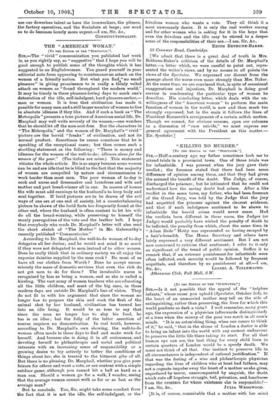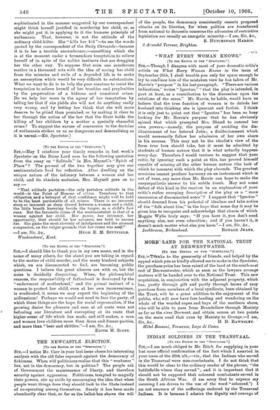LT0 THE EDITOR OF TIM • SPROTATOR:l
SIE,—Is it not possible that the appeal of the " helpless infants," whose cause you uphold (Spectator, October 3rd), to the heart of an unmarried mother may tell on the side of extinguishing, rather than preserving, the lives for which this world presents so dark a vista ? I well remember, many years ago, the expression of a physician (afterwards distinguished) at a time when the misery of the poor was much in all men's minds. "It is an astonishing thing, when one comes to think of it," he said, " that in the slums of Loudon a doctor is able to bring an infant into the world with any earnest endeavour to preserve the little life there taking its start. For all that human eye can see, the best thing for every child born in certain quarters of London would be a speedy death. We must not think of all that. Our instinct to preserve life in all circumstances is independent of rational justification." If that was the feeling of a wise and philanthropic physician regarding the lives of children who at least had fathers, may not a cognate impulse sway the heart of a mother as she gives, nnprefaced by terror, unaccompanied by anguish, the death which cuts off hopeless struggle, toil, privation, and loneliness from the creature for whose existence she is responsible ?— [It is of course, conceivable that a mother with her mind sophisticated in the manner suggested by our correspondent might think herself justified in murdering her child, or, as she might put it, in applying to it the humane principle of euthanasia. That, however, is not the attitude of the ordinary child-killer. She "kills her kid "—to use the words quoted by the correspondent of the Daily Chronicle—because it is to her a terrible encumbrance,—something which she is at the moment under a tremendous temptation to relieve herself of in spite of the nobler instincts that are dragging her the other way. To suppose that even one murderous mother in a thousand acts with the idea of saving her child from the miseries and evils of a degraded life is to make an assumption which would be very difficult to substantiate. What we want to do is to help the poor creature to resist the temptation to relieve herself of her troubles and perplexities by the perpetration of a hideous and unnatural crime. Do we help her more in the agony of her temptation by telling her that if she yields she will not do anything really very wrong, and by letting her think that she will more deserve to be pitied than punished, or by making it clear to her through the action of the law that the State holds the killing of her children by a mother a specially shameful crime ? To suggest the excuse of conversion to the doctrine of euthanasia strikes us as as dangerous and demoralising as it is unreal.—En. Spectator.]















































 Previous page
Previous page